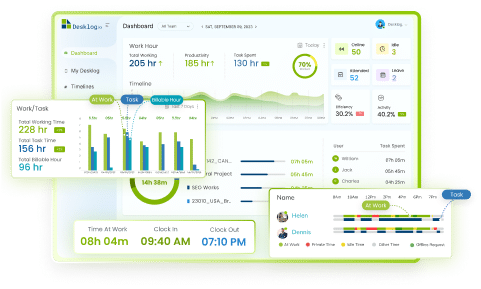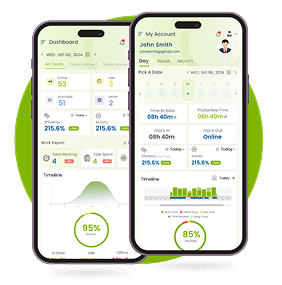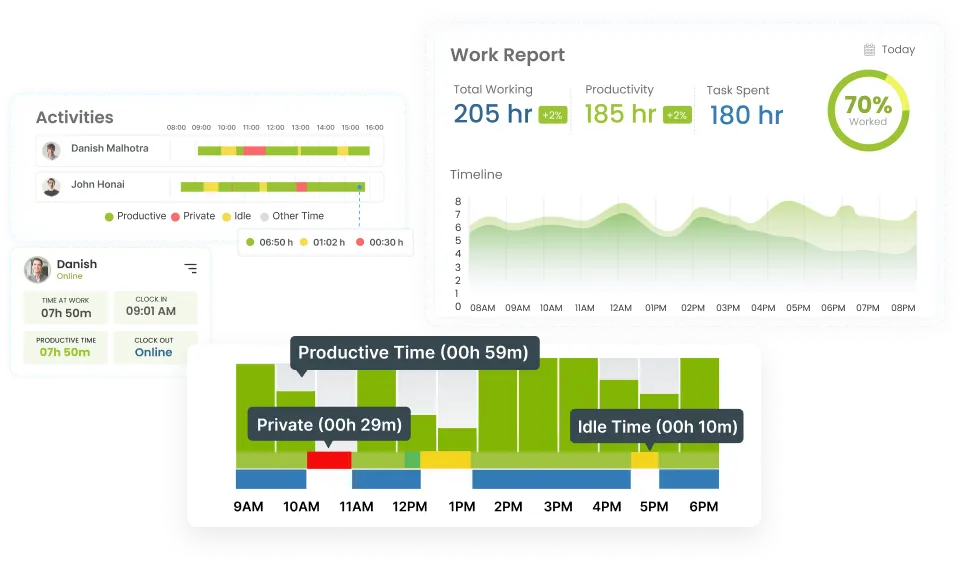In the fast-moving world of small business management, time plays an important role. From handling multiple projects to ensuring timely payments, it is crystal clear that efficient project billing and time tracking tools are the lifeblood of productivity. But fear not, for in the digital age, a plethora of tools exist to streamline these processes and supercharge your business. Join us as we look at five indispensable tools designed to revolutionize how small businesses manage their projects, finances, and time. Get ready to look at the different ways to achieve peak productivity and profitability!
Basics: Project Billing and Time Tracking

For small businesses, every minute and every dollar counts. Having said that, efficient project billing within a time tracking software is fundamental for maximizing productivity, profitability, and client satisfaction.
Here’s why they matter:

Accurate Billing
Project billing and time tracking are essential for ensuring accurate invoicing. By meticulously tracking the time spent on each project, businesses can bill their clients precisely for the actual work done.
This avoids scenarios where businesses might inadvertently charge less (underbilling) due to untracked work hours or overcharge (overbilling), which can negatively impact client trust.

Enhanced Productivity
Implementing a project billing and time tracking system allows businesses to monitor project progress and employee productivity closely. By tracking how time is spent, businesses can identify inefficiencies and areas for improvement.
This in turn leads to better resource allocation and scheduling. Further, this will result in more efficient project completion and potentially higher profitability.

Improved Transparency
Transparency in billing and time allocation fosters trust between businesses and their clients. By using a time tracking software, businesses can provide clients with clear, detailed accounts of how time was spent on their projects. This transparency not only builds trust but also can strengthen client relationships and lead to repeat business.

Data-Driven Decisions
Accurate project billing and time tracking generate valuable data that businesses can use for strategic planning. Historical data on project duration and costs help in making informed decisions about future project pricing, resource allocation, and management strategies. This data-driven approach enables businesses to optimize operations and improve overall efficiency.
By harnessing the right tools, small businesses can streamline these processes and optimize project work, leading to improved profitability and sustainable growth.
Top 5 Project Tracking Tools
Gone are the days when companies preferred traditional project management software. With the swift passage of technologies, several tools have emerged as leaders, each offering unique features and benefits tailored to different business needs. Here’s an overview of the top five tools in this space:
- Desklog – Time tracking and productivity monitoring tool.
- Clickup – Versatile project management with time tracking.
- Harvest – Simplifies time tracking and invoicing for small businesses.
- Everhour – Powerful project management and time tracking tool.
- Paymo – Integrated project management with time tracking and invoicing.

1. Desklog
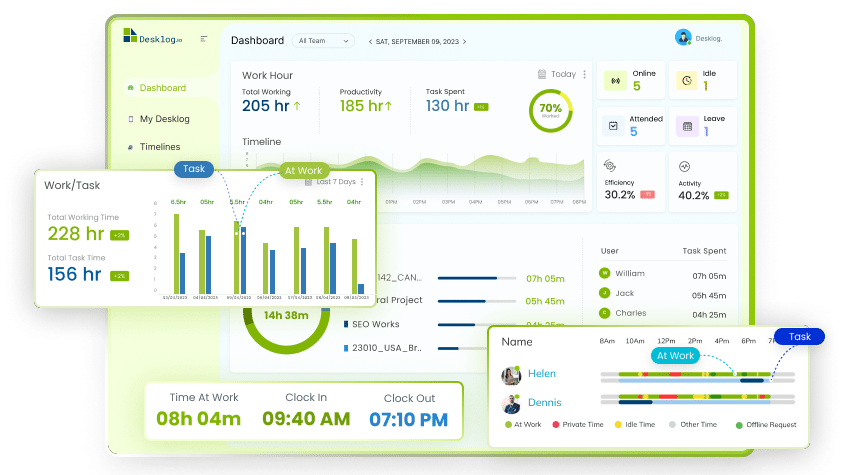
Desklog is a comprehensive time tracking and productivity monitoring tool designed for businesses of all sizes. It offers features such as real-time activity tracking, project time tracking, screenshots, reports, and integrations.
Time Tracking and Project Billing: Desklog’s accurate tracking of time and activities not only ensures precise project billing but also contributes to enhancing employee satisfaction. It also helps in acknowledging and valuing the efforts of employees, which is key in fostering a positive and productive work environment. This in turn prevents toxic productivity.

Pros
Real-time activity tracking, customizable reports, integrations with various project management tools like Jira.
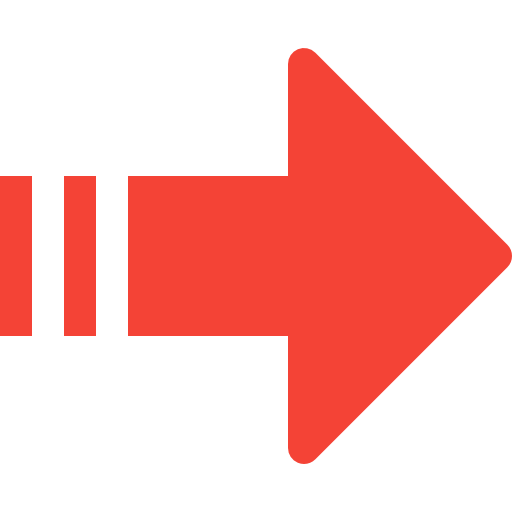
Cons
The lack of a Chrome extension might limit its accessibility for some users who prefer browser-based integrations.
Review
Desklog is a robust solution for businesses seeking comprehensive time tracking and productivity monitoring capabilities. While it may have a learning curve, its rich feature set and integrations make it a valuable asset for small businesses.
| overall |  4.8 4.8 |
| Ease of Use |  4.9 4.9 |
| Customer Service Software |  4.8 4.8 |
| Features |  4.8 4.8 |
| Value for Money |  4.8 4.8 |
Source :
Work Smarter & Accomplish Goals with Desklog
Get Started Now
2. Clickup

ClickUp is a comprehensive productivity platform that combines project management and time tracking features. It is designed to enhance team collaboration, task management, and overall productivity. Key features include task assignments, goal tracking, document management, and native time tracking.
ClickUp excels in streamlining tasks and workflows. It offers a range of views like List, Board, and Box, making it adaptable to various project management styles. Its time tracking feature is integrated directly into tasks, facilitating easy monitoring of work hours and productivity.

Pros
Highly customizable, integrates with a wide range of other tools, offers multiple views for different management styles, and includes advanced features like document management and goal tracking.

Cons
Can be overwhelming due to its extensive range of features; some users might experience a steep learning curve.
Review
ClickUp stands out as a dynamic and feature-rich platform ideal for teams looking for an all-in-one project management and time tracking tool. Its versatility and customization options make it a strong contender for businesses aiming to streamline their productivity and collaborative efforts.
| overall |  4.7 4.7 |
| Ease of Use |  4.4 4.4 |
| Customer Service Software |  4.6 4.6 |
Source :

3. Harvest
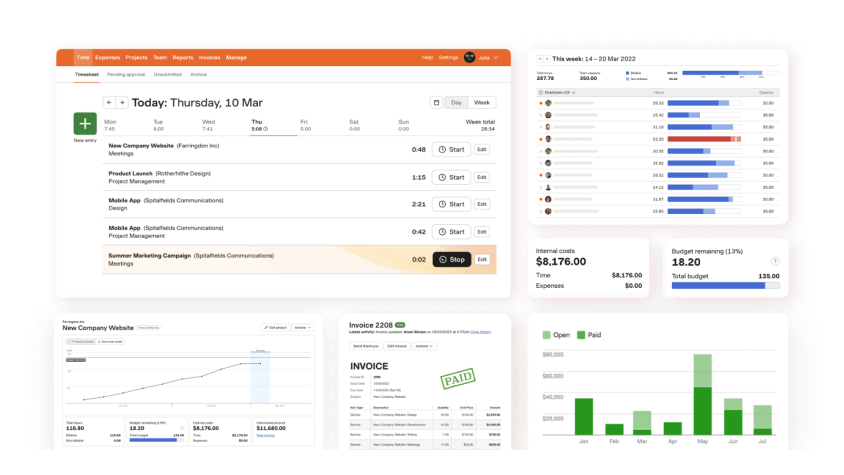
Harvest is a popular time tracking and invoicing tool designed to help businesses streamline their billing processes. It offers features such as time tracking, expense tracking, invoicing, and project budgeting.
Time Tracking and Project Billing: Harvest makes time tracking effortless with its intuitive interface and timer functionality. It facilitates project billing by generating professional invoices based on tracked time and expenses.

Pros
Simple and user-friendly interface, powerful reporting capabilities, seamless integration with other business tools.

Cons
Limited features in the free version, pricing may be expensive for small businesses with larger teams.
Review
Review: Harvest is a reliable choice for businesses in need of robust time tracking and invoicing solutions. Its user-friendly interface and extensive reporting features make it a valuable asset for small businesses.
| overall |  5.0 5.0 |
| Ease of Use |  5.0 5.0 |
| Customer Service Software |  5.0 5.0 |
| Features |  5.0 5.0 |
| Value for Money |  5.0 5.0 |
Source :

4. Everhour
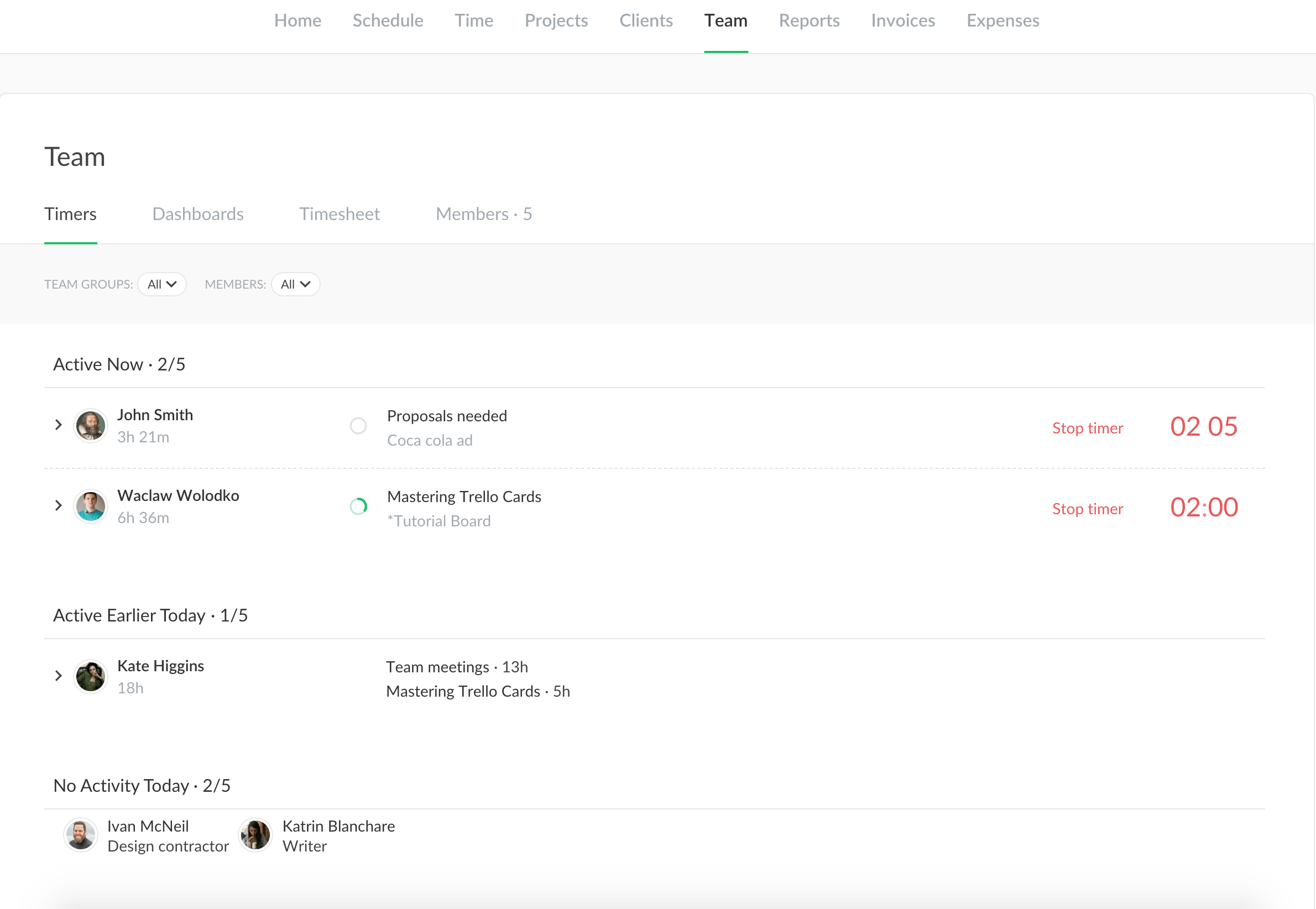
Everhour is a time tracking and project management tool designed to help teams track time, set budgets, and manage projects more effectively. It offers features like time tracking, project budgeting, reporting, and integrations.
Time Tracking and Project Billing: Everhour simplifies time tracking with its browser extension and integration with popular project management tools. It aids in project billing by providing accurate time logs and budget tracking functionalities.

Pros
Seamless integration with project management tools like Trello, Asana, and Basecamp, customizable reports, flexible pricing options.

Cons
Some users may find the interface less intuitive compared to other tools, limited invoicing features.
Review
Everhour is a versatile solution for businesses seeking robust time tracking and project management capabilities. Its seamless integrations and budget tracking features make it a valuable tool for small businesses.
| overall |  4.7 4.7 |
| Ease of Use |  4.6 4.6 |
| Customer Service Software |  4.7 4.7 |
| Features |  4.5 4.5 |
| Value for Money |  4.6 4.6 |
Source :

5. Paymo
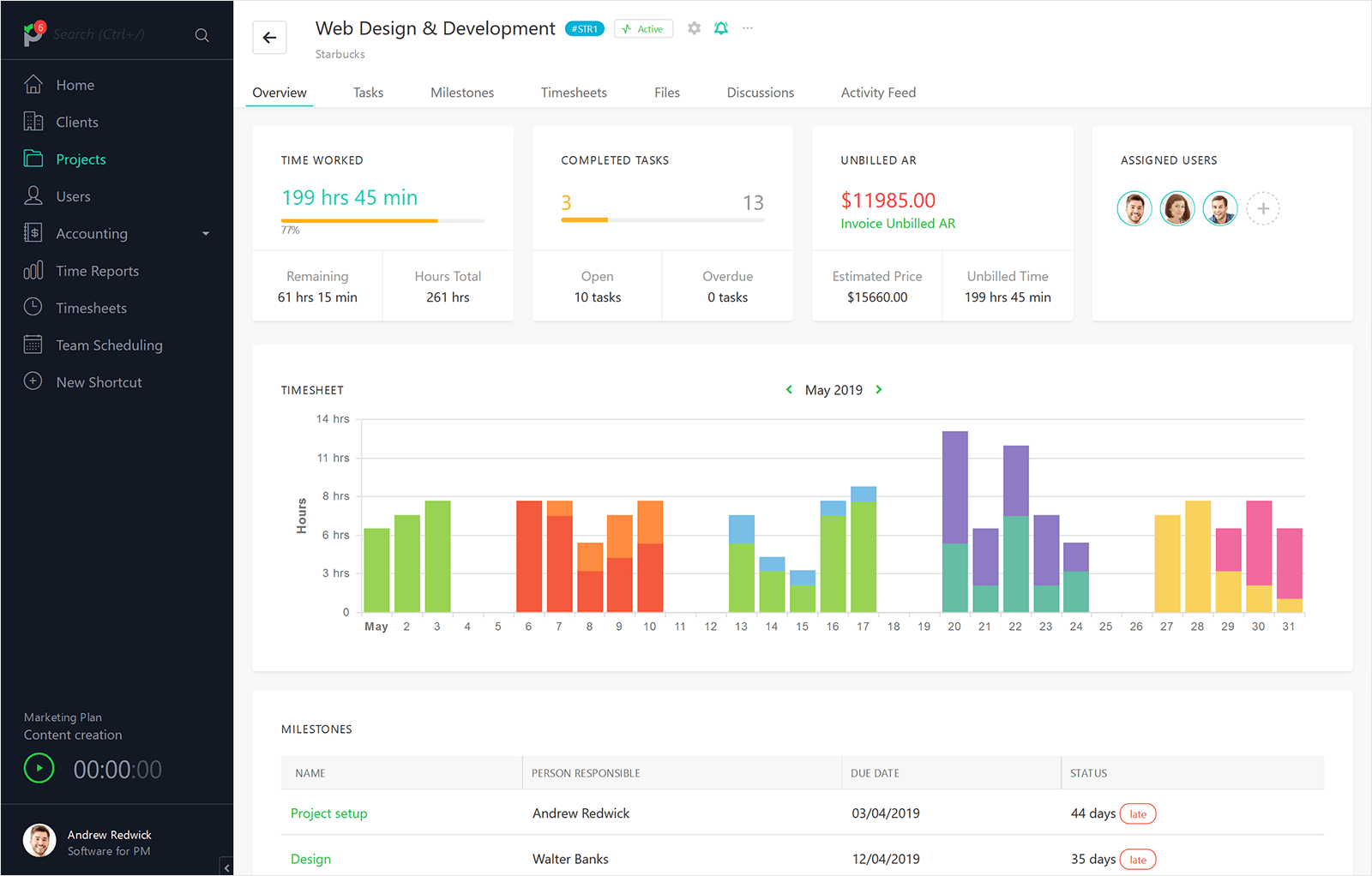
Paymo is an integrated project management application focusing on small to medium-sized businesses. It specializes in streamlining the workflow from project inception to billing. Key features include task management, time tracking, resource scheduling, and invoicing.
Paymo is really good at linking project tasks with time tracking. It gives clear information on how far the project has come, how resources are used, and how to manage the budget. The time tracking tool included in it is key for correctly billing clients and managing time within the team.

Pros
Offers a comprehensive set of tools for managing the entire project lifecycle, excellent for tracking billable hours and expenses, user-friendly interface, and effective for remote team collaboration.

Cons
Some users may find it lacks advanced customization options; the invoicing feature, while useful, might not be as robust as standalone invoicing software.
Review
Paymo is a solid choice for businesses that need a seamless integration of project management and financial tracking. Its emphasis on combining task management with time billing makes it a valuable tool for improving efficiency and ensuring accurate project delivery and billing.
| overall |  4.7 4.7 |
| Ease of Use |  4.6 4.6 |
| Customer Service Software |  4.7 4.7 |
| Features |  4.5 4.5 |
| Value for Money |  4.6 4.6 |
Source :
Comparative Analysis of Popular Project Billing and Time Tracking Tools
This table provides a detailed comparison of five leading project billing and time tracking tools: Desklog, Hubstaff, Harvest, Everhour, and Toggl Track. The comparison focuses on key features of a perfect time tracking software to offer a comprehensive view of each tool’s capabilities. This analysis is designed to assist in identifying the most suitable software solution for your project management and billing needs.
| Features | Desklog | Harvest | Clickup | Everhour | Paymo |
|---|---|---|---|---|---|
| Automated Time Tracking |  |
 |
 |
 |
 |
| Project Time Tracking |  |
 |
 |
 |
 |
| Automated Timesheet |  |
 |
 |
 |
 |
| Web Timer |  |
 |
 |
 |
 |
| Absence Management |  |
 |
 |
 |
 |
| Shift Management |  |
 |
 |
 |
 |
| Project Billing |  |
 |
 |
 |
 |
| Offline Time Tracking |  |
 |
 |
 |
 |
| Idle Time Tracking |  |
 |
 |
 |
 |
| App & URL Tracking |  |
 |
 |
 |
 |
| Document Title Tracking |  |
 |
 |
 |
 |
| Time Request |  |
 |
 |
 |
 |
| Optional Screenshots |  |
 |
 |
 |
 |
Advantages of Project Billing in Small Business
Project billing plays a crucial role in the financial health and operational efficiency of small businesses. By implementing effective project time tracking practices for small businesses, they can streamline their invoicing processes, accurately track revenue, and ensure transparency in financial transactions.
Here are the key advantages of project billing for small businesses:

Transparent Revenue Generation
Project billing provides small businesses with clear insights into their revenue generation process. This enables informed decision-making and strategic planning. It helps understand which projects are profitable and which ones may require adjustments.

Accurate Cost Allocation
Project billing helps small businesses allocate costs accurately. This includes labor, materials, and overhead expenses. Tracking these costs ensures pricing strategies are aligned with actual resources invested.

Improved Client Relationships
Transparent and timely project billing fosters trust with clients. Clear invoicing practices enhance client satisfaction and encourage repeat business. This contributes to long-term business success.

Efficient Resource Utilization
Project billing allows businesses to assess resource utilization efficiency. Tracking billable hours and expenses against project budgets enables better resource allocation. This maximizes productivity and profitability.

Streamlined Financial Management
Project billing systems streamline financial management processes. They automate invoicing, track payments, and reconcile accounts. This reduces administrative overhead and frees up resources for core business activities and growth.
Conclusion
To sum up, the blog “5 Essential Project Billing and Time Tracking Tools for Boosting Small Business Productivity” highlights key tools that are vital for the efficient management of small businesses. Tools like Desklog, Hubstaff, Harvest, Everhour, and Toggl Track offer unique features ranging from simple time tracking and invoicing to comprehensive project management. By leveraging these tools, small businesses can enhance productivity, improve billing accuracy, and streamline operations. These tools are not just about tracking time; they’re about optimizing the most valuable resource in business – time itself. For small businesses looking to grow and thrive in a competitive environment, adopting these tools is a step towards achieving greater efficiency and success.
FAQ
1What is project billing?
Project billing refers to the process of invoicing clients for services rendered or work completed within a specific project. It involves detailing the costs associated with the project, such as labor, materials, and any additional expenses.
2How do you determine project billing rates?
Project billing rates are typically determined based on factors such as the scope of work, the expertise required, industry standards, and the market value of the services provided. Companies often calculate rates by estimating the time and resources needed to complete the project and then applying an appropriate markup.
3What are the different types of project billing methods?
Common project billing methods include:
- Time and materials (T&M)
- Fixed fee or lump sum
- Cost-plus
- Milestone billing
- Retainer-based billing
4What is time and materials (T&M) billing?
Time and materials billing involves charging clients for the actual hours worked by employees or contractors, as well as the cost of materials used. This method provides flexibility but can be less predictable in terms of total project cost.
5How does fixed fee billing work?
Fixed fee billing, also known as lump sum billing, involves charging clients a set amount for the entire project, regardless of the actual time or resources expended. This method offers predictability for both parties but requires careful estimation to avoid losses.
6What is cost-plus billing?
Cost-plus billing involves billing clients for the actual costs incurred during the project, plus an additional percentage or fixed fee as profit. This method provides transparency but may require trust between the client and the service provider.
7What is milestone billing?
Milestone billing involves invoicing clients at specific project milestones or stages of completion. Payments are tied to the achievement of predefined objectives, such as project phases or deliverables.
8How does retainer-based billing work?
Retainer-based billing involves clients paying a recurring fee in advance to secure access to services over a specified period. This method provides a steady income stream for service providers and ensures ongoing support for clients.
9How do you handle changes to project scope or requirements in billing?
Changes to project scope or requirements often require adjustments to the billing structure. Depending on the terms of the contract, additional charges may apply for extra work or materials, or the billing method may need to be renegotiated.
10What measures should be taken to ensure accurate project billing?
To ensure accurate project billing, it’s essential to:
- Maintain detailed records of time, expenses, and materials.
- Communicate clearly with clients about billing procedures and expectations.
- Regularly review and reconcile invoices to avoid errors or discrepancies.
- Implement robust billing software or systems to streamline the process.
- Address any billing-related issues promptly and professionally to maintain client trust.
